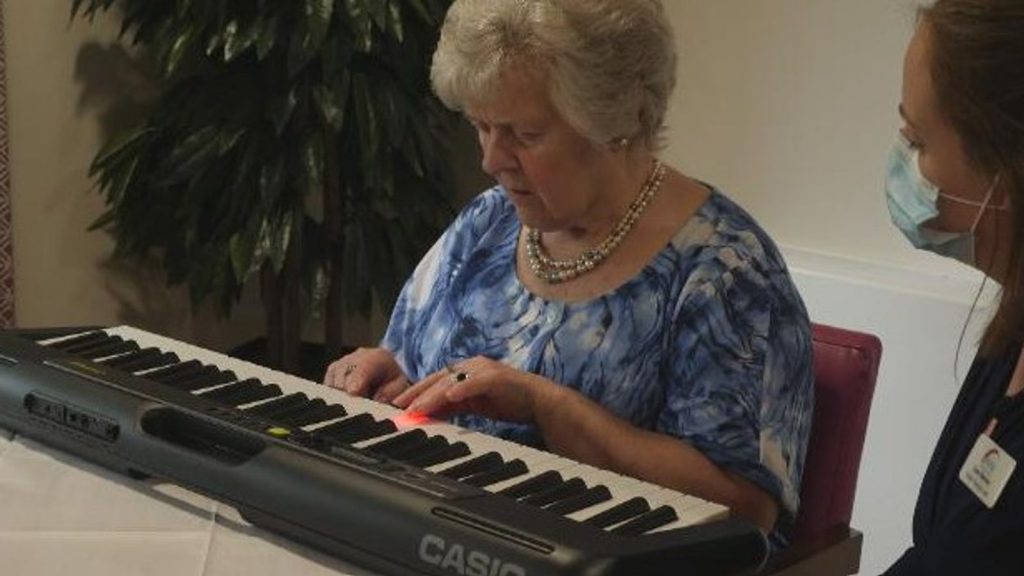Music’s power to ‘unlock memories and emotions’ helps in dementia treatment, survey suggests
The power of music to treat dementia has been further reinforced by a new survey.In a collaboration between the charity Music for Dementia and the keyboard manufacturer Casio, more than 100 dementia patients were enrolled in six months of musical therapy.
Care homes were sent specialised keyboards that allowed residents to play along to their favourite songs in the presence of a musical therapist.At the end of the six-month period, 79% of musical therapists reported their patients showed improved memory and recall, and more than 70% saw reductions in anxiety and depression.The survey builds on a number of recent scientific studies, such as one published in the Lancet earlier this year.
It found that music had a clinically significant impact on reducing depression and other symptoms in care home residents suffering from dementia.There are several reasons music may be an effective method of treatment.
More from UK
Clare Barone, musical therapy lead at Methodist Homes, said: “From a therapeutic perspective, music can touch emotions, unlock memories, and the two go hand-in-hand really.”So positive memories can just bring somebody alive, reminiscence, positive wellbeing, the engagement in something, a meaningful activity – like we saw with Jill – playing the keyboard actually brought back memories of her children and playing in the past and the importance of that song for her.”
Advertisement
Jill is an 82-year-old resident living with moderate-stage mixed dementia.Over the course of her treatment, she saw a marked cognitive improvement, going from being able to recognise and whistle along to a familiar melody, to playing parts of it with the keyboard’s assistive technology.During a demonstration for Sky News, Jill played much of the piece before admitting with a wry smile: “I don’t know how the hell I did that.”Grace Meadows, campaign director at Music for Dementia, said: It’s innovative, creative initiatives like this which demonstrate how easy it can be for carers to make music a part of good dementia care.”We would like to see this programme rolled out nationwide as a way of supporting carers to provide the best possible personalised care for those living with dementia.”In April, Culture Secretary Nadine Dorries backed a plan to create a “power of music commissioner” to promote the benefits of music in a variety of healthcare settings.The political will, it appears, is there, if it can survive the imminent arrival of another new Conservative administration.

The power of music to treat dementia has been further reinforced by a new survey.
In a collaboration between the charity Music for Dementia and the keyboard manufacturer Casio, more than 100 dementia patients were enrolled in six months of musical therapy.
Care homes were sent specialised keyboards that allowed residents to play along to their favourite songs in the presence of a musical therapist.
At the end of the six-month period, 79% of musical therapists reported their patients showed improved memory and recall, and more than 70% saw reductions in anxiety and depression.
The survey builds on a number of recent scientific studies, such as one published in the Lancet earlier this year.
It found that music had a clinically significant impact on reducing depression and other symptoms in care home residents suffering from dementia.
There are several reasons music may be an effective method of treatment.
Clare Barone, musical therapy lead at Methodist Homes, said: “From a therapeutic perspective, music can touch emotions, unlock memories, and the two go hand-in-hand really.
“So positive memories can just bring somebody alive, reminiscence, positive wellbeing, the engagement in something, a meaningful activity – like we saw with Jill – playing the keyboard actually brought back memories of her children and playing in the past and the importance of that song for her.”
Jill is an 82-year-old resident living with moderate-stage mixed dementia.
Over the course of her treatment, she saw a marked cognitive improvement, going from being able to recognise and whistle along to a familiar melody, to playing parts of it with the keyboard’s assistive technology.
During a demonstration for Sky News, Jill played much of the piece before admitting with a wry smile: “I don’t know how the hell I did that.”
Grace Meadows, campaign director at Music for Dementia, said: It’s innovative, creative initiatives like this which demonstrate how easy it can be for carers to make music a part of good dementia care.
“We would like to see this programme rolled out nationwide as a way of supporting carers to provide the best possible personalised care for those living with dementia.”
In April, Culture Secretary Nadine Dorries backed a plan to create a “power of music commissioner” to promote the benefits of music in a variety of healthcare settings.
The political will, it appears, is there, if it can survive the imminent arrival of another new Conservative administration.
